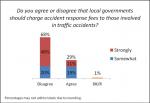Research Publications
Auto Insurance Telematics: Consumer Attitudes and Opinions
The report explores consumer attitudes and opinions with respect to auto insurance telematics and usage-based insurance (UBI). The report finds that many drivers participating in telematics programs change their driving behavior in response to information provided by their insurance companies about their driving that was gathered with a telematics device. The report also confirms that many drivers are concerned about the privacy of their personal information.
Shopping for Auto Insurance and the Use of Internet-Based Technology
This report examines how often consumers shop for auto insurance, how they go about shopping, the choices made after shopping, satisfaction with the shopping experience, and the use of Internet-based personal technology when shopping for insurance. The report also looks at differences in shopping behavior and technology use across demographic groups
Public Attitude Monitor 2011, Accident Response Fees
Sixty-eight percent of adults disagree with the idea that local governments should charge accident response fees to individuals involved in traffic accidents, according to a new study from the Insurance Research Council (IRC). When reminded that requiring insurance companies to pay accident response fees could lead to higher auto insurance costs, 69 percent of survey respondents disagreed with the idea of local governments charging accident response fees.
Public Attitude Monitor 2010, Texting While Driving
Almost one-in-five drivers in the United States (18 percent) reported texting while driving in the last 30 days according to a new survey from the Insurance Research Council (IRC). Younger drivers were much more likely than older drivers to say that they were texting while driving. Forty-one percent of drivers age 25 to 39, compared to only 5 percent of drivers 55 and older, reported texting while driving. Thirty-one percent of drivers age 16 to 24 said they had texted while driving in the last 30 days.
Public Attitude Monitor 2010: First-Party Bad-Faith Legislation
New public opinion survey findings from the Insurance Research Council (IRC) indicate that a majority of Americans believe that adopting new laws allowing people to sue their own auto insurance company for punitive damages, in addition to receiving benefits for their insured claim losses, is not a good idea. Twenty-six percent of those surveyed said that allowing such lawsuits was a poor idea, and 31 percent said it was only a fair idea.
Public Attitude Monitor 2009, Insurance Satisfaction and Shopping
An overwhelming majority of consumers with auto and homeowners insurance are satisfied with their insurance companies, according to a new public opinion study by the Insurance Research Council (IRC). Ninety-one percent of respondents with auto insurance said that they were either very satisfied (61 percent) or fairly satisfied (30 percent) with their current auto insurer. Eighty-nine percent of homeowners said that they were either very satisfied (56 percent) or fairly satisfied (33 percent) with their homeowners insurance company.
Public Attitude Monitor 2009, Consumers Response to the Economic Downturn
A new study by the Insurance Research Council (IRC) finds that many Americans have taken steps to reduce personal insurance costs in response to the economic downturn, but that maintaining essential auto and homeowners coverage remains a priority for the vast majority of consumers. Twenty-eight percent of those with auto insurance coverage surveyed for the study reported shopping for lower rates when they normally would not have done so. Among those with auto or homeowners insurance, 15 percent said they had increased their insurance deductibles or reduced the amount of coverage in order to reduce premium costs.
Public Attitude Monitor 2007, Issue 1
The first issue of the Insurance Research Council’s Public Attitude Monitor 2007 (PAM) analyzes public opinion on a range of issues related to highway safety and traffic enforcement.
Public Attitude Monitor 2006, Issue 2
The second issue of the Insurance Research Council’s Public Attitude Monitor 2006 (PAM) examines the public's attitudes and opinions on a variety of issues related to natural disasters and how attitudes and opinions differ based on proximity to the Atlantic Ocean or the Gulf of Mexico. Findings show that Americans living in close proximity to the coastline were more likely to favor strong building codes and the rebuilding of coastal wetlands. Coastal residents also were more likely to report taking steps to prepare for future natural disasters. Those living in non-coastal areas were more likely to disapprove of taxpayer and policyholder subsidies of insurance costs for those living in high risk areas.
- Purchase PDF ()
- Purchase Printed ()
- View News Release








